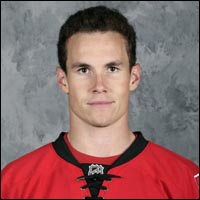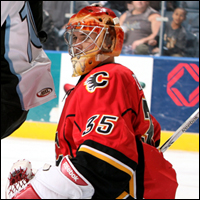by Lindsay Kramer || NHL.com
Lindsay Kramer, the AHL correspondent for NHL.com, profiles an up-and-coming player each Monday during the season, and his AHL notebook appears each Thursday on NHL.com.
 The first shot that Quad City Flames rookie goalie Leland Irving saw in the AHL was one he’ll never forget.
The first shot that Quad City Flames rookie goalie Leland Irving saw in the AHL was one he’ll never forget.
It came off the stick of Iowa’s Andrew Ebbett, just 1:06 into Irving’s debut on Oct. 18, 2008. Ebbett, on a breakaway, faked five-hole and then beat the youngster with a backhand. Irving gave up four goals in the Flames’ loss.
"When it went in, it was like, ‘uh-oh,’" said Irving, 20. "It’s not really the way I was hoping to start. I tried to put it behind me."
That’s the move of a veteran. In Leland’s very next game, against Rochester, an Amerks player had a breakaway and tried the exact same fake on his team’s first shot of the game.
Nope. Irving went to school from the first game and turned away the bid. Even though Irving had another shaky outing in a 5-4 loss, he gave an early sign of his greatest attribute — an unquenchable drive to move ahead.
After a slow November, Irving posted a 1.87 goals-against average and .937 save percentage in December and 1.99, .921 in January. Overall, for a Quad City team that’s tied for sixth in the West, he is second among all AHL rookies with a 2.35 GAA.
"He definitely doesn’t let a lot of bad things affect him. He has thick skin for sure," said Flames coach Ryan McGill. “If he can use that to his advantage, it will help him."
It already has, and in the most important battle of all. As many who have followed Irving’s story know, he is a survivor of a rare form of childhood cancer known as rhabdomyosarcoma. The often-fatal disease forced him to undergo more than a year of chemotherapy at ages 7 and 8. It temporarily shattered an idyllic childhood in Swan Hills, Alberta (pop: 1,858), a hometown where hockey and snowmobiling are just behind food and water on the priority list.
"I was young at the time. I still had a pretty good idea of what’s going on," Irving said. "Now, I remind myself it (hockey) is just a game. It’s not life or death. To some people, it may seem that way. I’m reminded not only by my own experience, but also (by) people around me."
That type of hardscrabble lesson took root well before Irving’s personal battle. He watched the daily grind of his father, Bruce, who built an excavation company in Swan Hills, an area heavily into the oil and gas industry. It’s a successful but taxing job, one that involves hands-on work such as digging ditches and fixing pipelines.
Leland spent some summers working for his dad, hand-digging holes, cutting down trees and back-filling.
"It’s hard labor, hard hats, overalls, boots," Leland said. "Depending upon how much shoveling you are doing, you can work up a pretty good sweat. By the end of that eight-hour day, you are exhausted."
 Leland is big on punching the clock and punching it hard, leaving self-pity behind. He recalls all throughout his chemo missing just one practice and one youth hockey game.
Leland is big on punching the clock and punching it hard, leaving self-pity behind. He recalls all throughout his chemo missing just one practice and one youth hockey game.
Yes, it was fun to practice with the Vancouver Canucks, and meet his idol, goalie Kirk McLean, as part of a Make-a-Wish trip when he was ill. But that was a gift that he pays forward now.
Irving has befriended a couple of cancer-stricken youngsters in the past year, including one who tragically passed away last summer. He is open to sharing his story and motivational outlook with anyone who wants to chat.
"It’s people like that who make it easy to appreciate everything I’m doing," he said. "I know it (cancer) is even harder for the younger ones. I just want all kids to have hope, no matter what their situation is, to believe they’ll be fine and continue living their dream."
That’s some heavy emotional baggage for a youngster with enough on his plate trying to make it in the pros and live up to his billing as the No. 26 overall pick by Calgary in the 2006 draft. But rather than running away from the task of acting like a role model, Irving walks hand-in-hand with it.
"Spending time with these kids is something totally different (than hockey)," he said. "I think it’s my responsibility to help young people, just like I was helped by people."
As secondary as hockey is to real-life issues, Irving understands that playing well gives him the platform to elevate himself and others. Irving said much of his slow start — 3.06, .851 through November — was attributable to impatience and committing to shots too soon. Once the understandable eagerness settled down, his game soared.
"It’s taking every bit of experience you get from the game, and working extremely hard in practice, treating it like a game," he said of the improvement. "I always knew it was a good league. What I didn’t know was how I was going to do in the league, what level I’m at. That’s what it’s all about, getting better and learning from your mistakes."
Perfection can be in the eye of the beholder. There could soon come a day when a meeting with Irving will inspire the same awe-struck wow in an ailing youth that the goalie felt during his dream-like practice with McLean.
How would Irving feel about that full-circle turn of events?
"That would be awesome," Irving said. "If they get any sort of hope or faith by seeing my experience, I’ve accomplished what I’ve wanted."

































